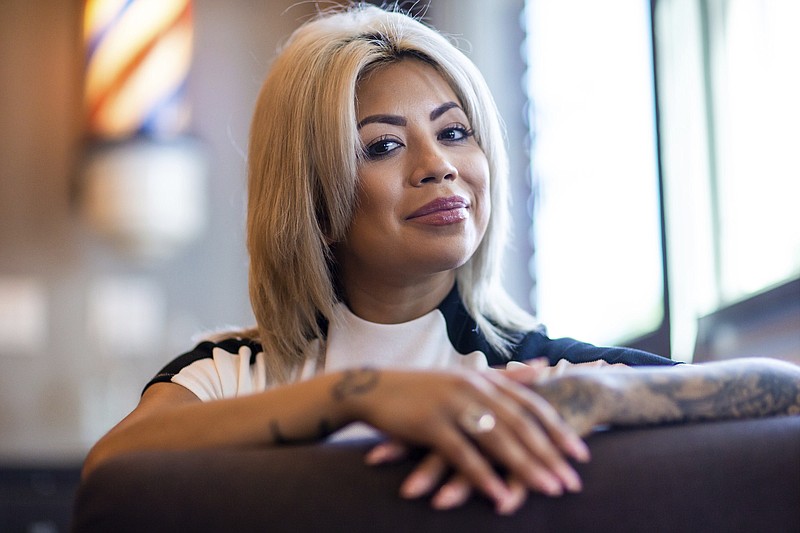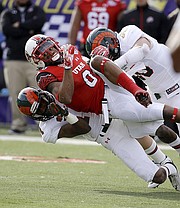DALLAS - When Lilly Benitez thinks about a barbershop, she pictures a steam towel enveloping her client's face. The tension dispelled with a quick scalp massage. The confidence from a fresh fade.
As the founder of Blade Craft Barber Academy in Deep Ellum, Benitez wants to challenge the traditional perception of what a barber should look like - and who a barber's client should be.
The Dallas Morning News reports she is training new generations of barbers to view the barbershop as a space where anyone - no matter how they identify - can feel comfortable asking for the service and care that they need.
Benitez wants her students to transform the barber's chair into a place where a simple service can have an impact on someone's day, state of mind - even their identity.
"That happens by creating relationships, creating a relationship with the individual, creating a relationship with that individual's community," says Benitez, 34, of Dallas.
The daughter of immigrants from El Salvador, Benitez was raised by her working-class father to prioritize family and community above all else. As a child, she watched her father put the same care into his appearance when he shaved and prepared for church.
Those memories inspired Benitez to get her barber's license, but almost immediately she started noticing little things in the industry that seemed exclusionary. As one of three women in her barber school class, Benitez was often disrespected by her male peers. She was also prohibited from taking on women as clients, simply because of their gender.
"Initially I thought about opening up my own barbershop," says Benitez.
Benitez pictured her future clients to be the people she grew up around: teachers, police officers, veterans and blue-collar, first-generation Americans.
Benitez also imagined her ideal employee to draw from both cosmetology and barbering. The salon setting that most cosmetologists worked at, she observed, focused on the client's experience. Barbering, in contrast, focused on precision and speed. Benitez wanted both.
But it was difficult to find people who had that exact mix of work experience. "What I realized was, 'Who am I going to hire?' I'll be in the same position that all of these (other shops) are in, hiring stylists that are not trained on barbering," says Benitez.
So instead, she decided to open a school and train the employees of her dreams.
Barbershops have long been a place to find community, especially for people of color. However, they have also traditionally been a space that excludes women and queer people, especially given the rise of high-end, men-only salons.
At Blade Craft, the curriculum is designed to make students think deeply about what they can bring to the barbering industry. One assignment requires students to visit spaces that are often segregated by gender, class or race - like nail salons, military recruitment centers or homeless shelters. Then, students reflect on their experiences in those settings.
A more holistic barbering education like Blade Craft's could lead to a more comfortable environment for both barbers and their clients, says Kristen Barber, author of "Styling Masculinity: Gender, Class, and Inequality in the Men's Grooming Industry."
"This is the first time I am hearing of a woman-owned barber school," wrote Barber. "And I don't think it's a coincidence that this sort of curriculum is emerging (there)."
This year, Blade Craft lead educator Nicole McCarter added weekly meditation sessions to the start of her lessons. "I'm someone that's introverted, so my energy gets drained really quickly," says McCarter. She knows that the fast pace of barbering can be taxing for many students, introverted or not, especially when some of them come from difficult backgrounds.
So McCarter integrated meditation into her lessons, "to get everybody more calm when maybe people aren't in the best spot."
Meditation, yoga lessons and life coach lectures attract students like Brandon Matthews, 35, of Dallas.
An Iraq War veteran who served as a linguist in the U.S. Army, Matthews had obtained his cosmetology license on a whim, but ended up falling in love with his new profession.
"I feel that it's about creating beauty," says Matthews. "Not just beauty in a superficial sense, but creating beauty in a complete sense of self-esteem, self-worth, self-value, self-empowerment."
Matthews understands that hair, identity and outlook are closely linked and loves that he can touch people's lives through a haircut. As a black man, Matthews is particularly excited to be a "curl specialist" who can work with textured hair. He also knows how something as simple as going from a military crew cut to a more relaxed look might make all the difference for a new veteran returning to civilian life.
Empowerment through personal care is precisely why tuition at Blade Craft includes a white barber's smock, custom tailored for each student.
"So many people have never had an individual item that's been made for them," says Benitez. A tailored smock, Benitez hopes, will serve as a reminder of the devotion she expects her students to bring to their own craft.
"Every time they put on their smock, (they know) 'It's mine, it's nobody else's, somebody measured me, a human being made this for me,'" says Benitez.
As a queer woman, Dunigan knows firsthand how hard it can be to find a barber willing to give her the haircut she wants. She works with several transgender clients who face similar struggles, and one of her priorities as a Blade Craft student is to learn how to better communicate with her clients.
"Before they came out, it was almost like they were getting the haircut they thought they should have, instead of what they wanted," says Dunigan. "I've seen people grow in my chair and find out who they are."
Empowerment, self-care and growth are all part of Benitez's vision for the barbers of tomorrow. Benitez believes that she and her students must strengthen community through barbering with a personal touch.
"Where I can help in my community is (with) the individual person that's coming in," says Benitez. "I can touch them and influence their physiology, I can influence their focus. I can show them appreciation."


